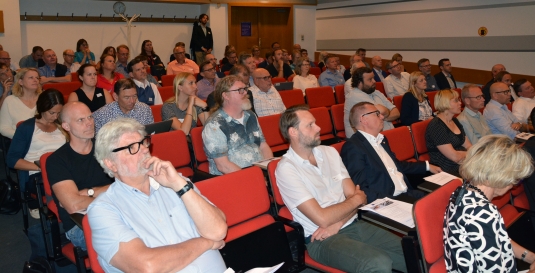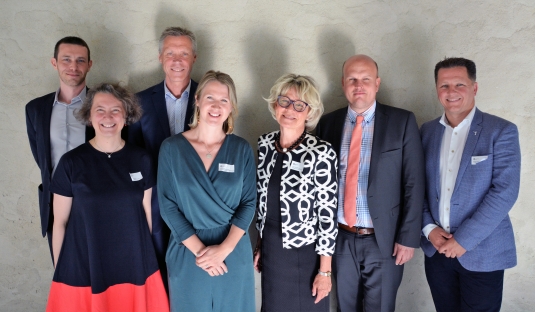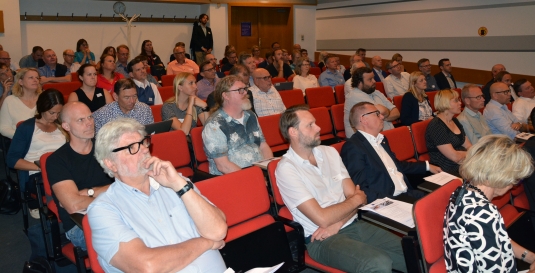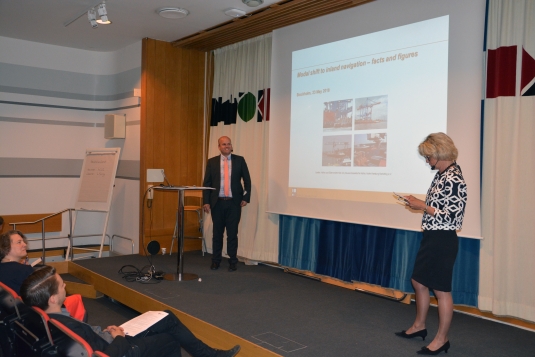

Inland navigation solutions for regional logistics were discussed in Stockholm
The Swedish barge operator Avatar Logistics AB, one of the partners in Project EMMA, organized an inland navigation conference in Stockholm together with the City of Stockholm.
The main topic of the conference was how to establish and develop inland navigation logistics within the regional areas in Sweden. Over 75 persons visited the conference that was held in Stockholm on the 23rd of May.
Several international experts shared their experiences of inland navigation and barge traffic as speakers. Karin de Schepper, Director at Inland Navigation Europe, shared examples of successful IWW development from a European perspective. She also gave recommendations of how Sweden can boost the development of inland navigation by a closer integration with other EU countries.
Amanda Baumgartner, Strategic Cargo Planner at the City of Stockholm, explained the city’s need for waterway solutions that result from the increased congestion and environmental impacts of the road transport system. Mrs. Baumgartner also declared how the City of Stockholm plans to integrate waterway transportation in their long-term logistics strategies.
Johan Lantz, CEO of Avatar Logistics, shared the experience of how to be the first commercial barge logistics company in Sweden. Mr. Lantz emphasized that more support and clearer strategies are needed from the Swedish Government concerning inland navigation. In his speech he underlined that Sweden needs to point out inland navigation as the 5th mode of transportation using the same regulations that already exist in other EU countries to achieve a same kind of operational environment for inland navigation as the road transportation currently has.
The customer’s perspective was presented by Fredrik Backman, Shipping Manager of PREEM Sweden AB. Mr. Backman explained why transport by a tank barge can be more efficient than using an IMO vessel on inland trade for petroleum from the Port of Gothenburg to the Port of Karlstad in Lake Vänern. He also requested a simpler legislation and pointed out the high pilot dues as a deal-breaker for business.
Henrik Armbrecht from PLANCO Consulting presented models of how to calculate a modal shift from road to inland waterway transportation. Mr. Armbrecht’s presentation contained both the socio-economic as well as the business-related calculations. He also presented successful case studies executed in the German IWT sector.
Manuel Garrido representing HAROPA Port of Paris gave the audience a guiding through many inland navigation projects that are going on in the Paris area. Among the projects he highlighted the FranPrix barge case and handling of excavated materials in the city centre of Paris. The focus on sustainability by the city of Paris gave a positive input to the ongoing IWT development in Sweden.
Michel van Gent, CEO of Vigilia Shipping Ltd., represented the view of the barge owner. Mr. van Gent explained how a modern barge is working in practice. He also gave an overview of the safety procedures in river navigation, crew education programs and how the other EU countries are cooperating within different IWT areas. Vigilia Shipping is operating dry bulk barges across Europe using different river systems. Consequently, he stressed the importance of the unification of regulations in order to achieve efficient navigation.




Johan Lantz
CEO of the Avatar Logistics AB
johan.lantz@avatarlogistics.se
Tel. +46 738 664 645